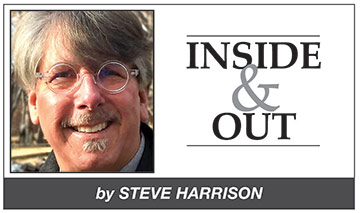Oh, to be common

by Steve Harrison
I wonder why so many of us are averse to being seen as ordinary, common, run-of-the-mill, regular Joes? At best these days those descriptors seem like back-handed compliments. He is predictable, leaves something to be desired, like excitement. A standard response lacks creativity. To be regular as dirt is, well, dirty. White bread, not so desirable; let it be sourdough, at least. Being average looking isn’t going to get you on The Bachelor. We live for excitement, the spectacular, the newsworthy, the adrenaline high.
I was just reading a feature story in Vanity Fair about Stephen Colbert. Near the end of the article when contemplating the upcoming Biden presidency, Colbert voiced gratitude that the new president is seen as sleepy, perhaps another way of describing his ordinariness.
He asks if it would be so terrible to not think of politics for a while, to not titter about twitter, to not cringe or cheer over the latest interview or sound bite? As a culture, Americans have been programmed to believe we are the city on the hill, special, exemplary, enviable. Perhaps for some the motto “Make America Great Again” reverberated because of the desire to fulfill that promise that every American feels is his or her birthright — being exceptional. Unfortunately, the last four years have not gotten us the attention we would have wanted twenty years ago or even yesterday.
As a baby boomer I can only think that my generation is largely responsible for this antipathy toward the normal. We are, after all, the generation whose every move was the subject of a home video. We were led to believe that a gold star was de rigueur, an award necessary for self worth. Our opinions were newsworthy, and no matter how extreme, righteous, or abhorrent, both sides of a debate could end up on Donahue’s stage, or Oprah’s, or the radio talk show. During my many years as a middle school teacher, my students wanted to believe all ideas were equal; and to point out that an opinion needed to be backed up with fact, example, or a common, repetitive result, proven to be more than a feeling or a hunch or bias, no matter how conventional, commonplace, or familiar was a hard sell.
Perhaps we want to be exceptional without the work. In his book “Outliers,” Malcolm Gladwell maintains that to be good, really good, at anything, requires 10,000 plus hours of guided practice. For most, practice has never been seen as desirable. Most of us want greatness, but we want to be born that way. We want to be gifted. We forget that even Tiger Woods or Babe Ruth or Serena Williams took many arm numbing swings before they became household names. The coveted gold star isn’t awarded by just showing up; it’s earned with lots of essential work. It’s demoralizing and overwhelming to confront the truth that we could be good, but to be so means working through limitations, self doubt and road blocks.
For boomers whose age is beginning to show and limit our chance at greatness if we haven’t already found it, it’s appealing to believe that our opinions, just by the mere fact of being our opinions, are worthwhile and great, perhaps even worth publishing. Who wouldn’t want to believe that greatness, if not fame and fortune, can come from filming ourselves for a TikTok or YouTube video or tweeting our latest observation or belief. Perhaps in an effort to not be common, we have amplified our mediocrity.







0 Comments